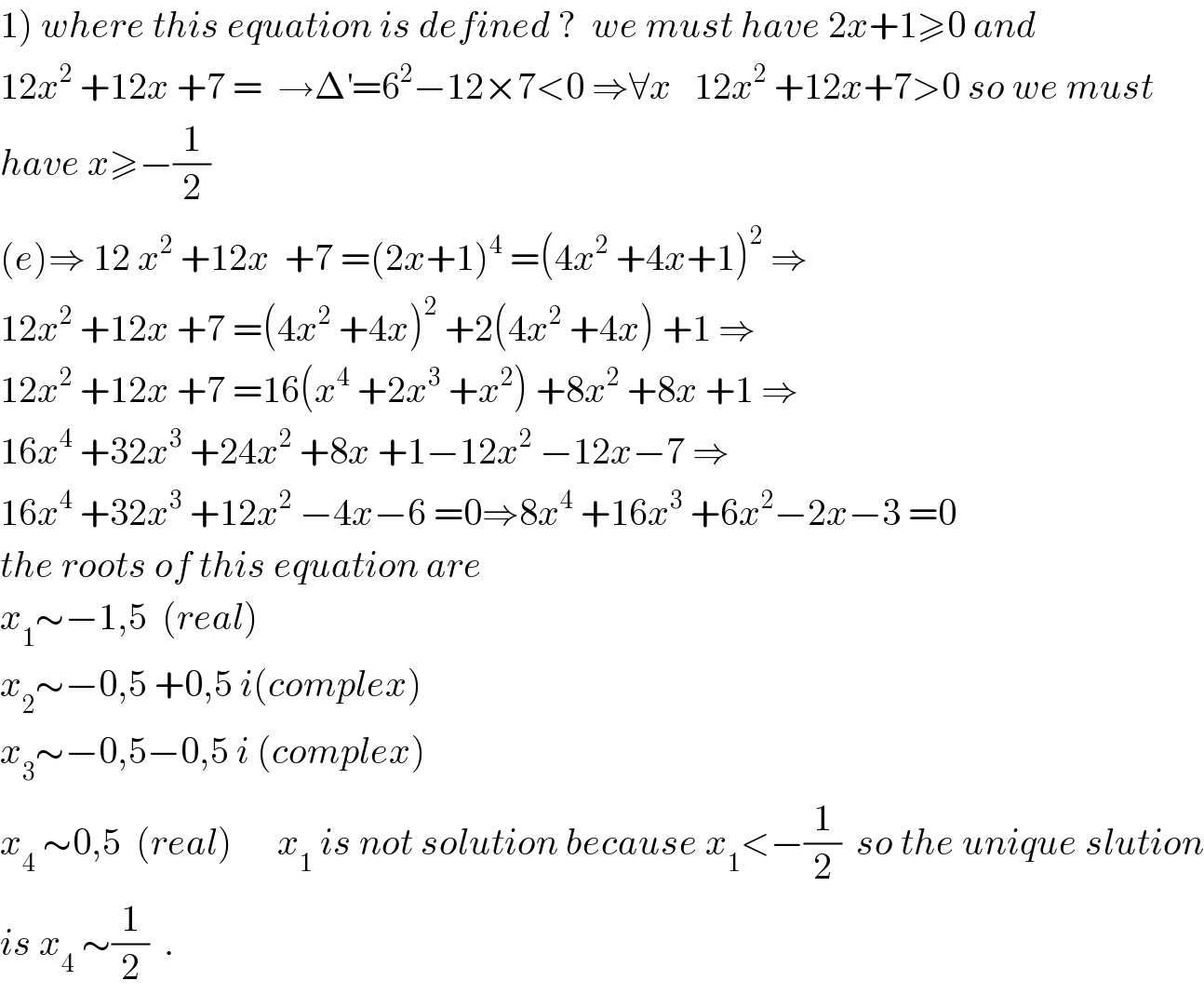Question Number 42543 by solihin last updated on 27/Aug/18

Commented by solihin last updated on 27/Aug/18

$${question}\:\:\mathrm{1}\:\:{please} \\ $$
Commented by maxmathsup by imad last updated on 27/Aug/18

$$\left.\mathrm{1}\right)\:{where}\:{this}\:{equation}\:{is}\:{defined}\:?\:\:{we}\:{must}\:{have}\:\mathrm{2}{x}+\mathrm{1}\geqslant\mathrm{0}\:{and} \\ $$$$\mathrm{12}{x}^{\mathrm{2}} \:+\mathrm{12}{x}\:+\mathrm{7}\:=\:\:\rightarrow\Delta^{'} =\mathrm{6}^{\mathrm{2}} −\mathrm{12}×\mathrm{7}<\mathrm{0}\:\Rightarrow\forall{x}\:\:\:\mathrm{12}{x}^{\mathrm{2}} \:+\mathrm{12}{x}+\mathrm{7}>\mathrm{0}\:{so}\:{we}\:{must} \\ $$$${have}\:{x}\geqslant−\frac{\mathrm{1}}{\mathrm{2}} \\ $$$$\left({e}\right)\Rightarrow\:\mathrm{12}\:{x}^{\mathrm{2}} \:+\mathrm{12}{x}\:\:+\mathrm{7}\:=\left(\mathrm{2}{x}+\mathrm{1}\right)^{\mathrm{4}} \:=\left(\mathrm{4}{x}^{\mathrm{2}} \:+\mathrm{4}{x}+\mathrm{1}\right)^{\mathrm{2}} \:\Rightarrow \\ $$$$\mathrm{12}{x}^{\mathrm{2}} \:+\mathrm{12}{x}\:+\mathrm{7}\:=\left(\mathrm{4}{x}^{\mathrm{2}} \:+\mathrm{4}{x}\right)^{\mathrm{2}} \:+\mathrm{2}\left(\mathrm{4}{x}^{\mathrm{2}} \:+\mathrm{4}{x}\right)\:+\mathrm{1}\:\Rightarrow \\ $$$$\mathrm{12}{x}^{\mathrm{2}} \:+\mathrm{12}{x}\:+\mathrm{7}\:=\mathrm{16}\left({x}^{\mathrm{4}} \:+\mathrm{2}{x}^{\mathrm{3}} \:+{x}^{\mathrm{2}} \right)\:+\mathrm{8}{x}^{\mathrm{2}} \:+\mathrm{8}{x}\:+\mathrm{1}\:\Rightarrow \\ $$$$\mathrm{16}{x}^{\mathrm{4}} \:+\mathrm{32}{x}^{\mathrm{3}} \:+\mathrm{24}{x}^{\mathrm{2}} \:+\mathrm{8}{x}\:+\mathrm{1}−\mathrm{12}{x}^{\mathrm{2}} \:−\mathrm{12}{x}−\mathrm{7}\:\Rightarrow \\ $$$$\mathrm{16}{x}^{\mathrm{4}} \:+\mathrm{32}{x}^{\mathrm{3}} \:+\mathrm{12}{x}^{\mathrm{2}} \:−\mathrm{4}{x}−\mathrm{6}\:=\mathrm{0}\Rightarrow\mathrm{8}{x}^{\mathrm{4}} \:+\mathrm{16}{x}^{\mathrm{3}} \:+\mathrm{6}{x}^{\mathrm{2}} −\mathrm{2}{x}−\mathrm{3}\:=\mathrm{0} \\ $$$${the}\:{roots}\:{of}\:{this}\:{equation}\:{are}\: \\ $$$${x}_{\mathrm{1}} \sim−\mathrm{1},\mathrm{5}\:\:\left({real}\right) \\ $$$${x}_{\mathrm{2}} \sim−\mathrm{0},\mathrm{5}\:+\mathrm{0},\mathrm{5}\:{i}\left({complex}\right) \\ $$$${x}_{\mathrm{3}} \sim−\mathrm{0},\mathrm{5}−\mathrm{0},\mathrm{5}\:{i}\:\left({complex}\right) \\ $$$${x}_{\mathrm{4}} \:\sim\mathrm{0},\mathrm{5}\:\:\left({real}\right)\:\:\:\:\:\:{x}_{\mathrm{1}} \:{is}\:{not}\:{solution}\:{because}\:{x}_{\mathrm{1}} <−\frac{\mathrm{1}}{\mathrm{2}}\:\:{so}\:{the}\:{unique}\:{slution} \\ $$$${is}\:{x}_{\mathrm{4}} \:\sim\frac{\mathrm{1}}{\mathrm{2}}\:\:. \\ $$
Commented by maxmathsup by imad last updated on 27/Aug/18

$${after}\:{verification}\:{we}\:{see}\:{that}\:\:{x}_{\mathrm{0}} =\frac{\mathrm{1}}{\mathrm{2}}\:{is}\:{a}\:{exact}\:{solution}\:{for}\:{this}\:{equation}. \\ $$
